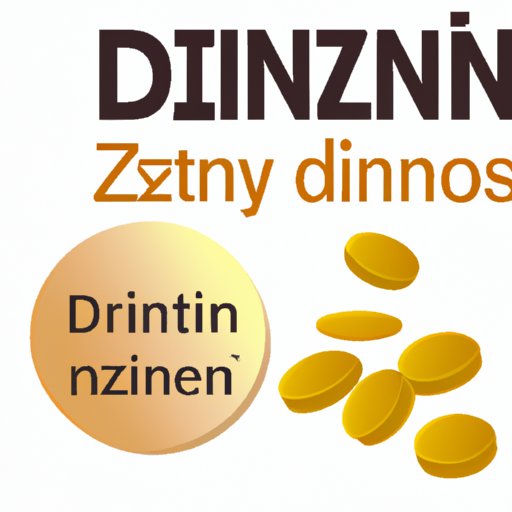
Introduction
As more people turn to vitamins and supplements to boost immunity and overall health, it’s essential to understand their impact on our bodies when consumed together. One such combination is zinc and vitamin D, which have proven benefits for the body regarding immune system, bone health, and mood regulation. However, the question arises whether it is safe to take zinc and vitamin D together. This article will provide a comprehensive guide to help you understand the pros and cons and potential risks of combining these supplements.
Pros and Cons of Taking Zinc and Vitamin D Together
Zinc and vitamin D are essential nutrients for overall health. Zinc helps in the formation and growth of new tissues and cells, while vitamin D promotes calcium absorption, boosting bone health. Combining these two supplements can provide added benefits such as improved immune system response and maintaining hormonal balance.
However, taking zinc and vitamin D together can also have risks and drawbacks, such as nausea, vomiting, and other gastrointestinal side effects. Moreover, consuming high doses or in the wrong form may lead to toxicity. Therefore, it’s always recommended to consult with a healthcare professional before starting any supplement regimen.
Understanding the Benefits of Zinc and Vitamin D
Both zinc and vitamin D have been extensively researched and proven to support many vital bodily functions.
Zinc plays a crucial role in boosting the immune system, wound healing, and maintaining healthy fertility levels. Low zinc levels can lead to impaired immunity, muscle weakness, and chronic diarrhea. Vitamin D is crucial in maintaining strong bones and teeth by regulating the absorption of calcium in the body. It also plays an important role in cell growth and regulating mood. The combination of zinc and vitamin D can promote overall wellness and protect the body from various illnesses.
Many individuals have experienced a positive impact on their health and wellbeing by combining these two supplements. For example, athletes have reported an improvement in their athletic performance, and others have noted a reduction in their symptoms of seasonal allergies. However, keep in mind that these results may not hold true for all individuals.
5 Foods Rich in Zinc and Vitamin D
Consuming a balanced diet rich in nutrients is the key to good health. Here are some of the top foods that are rich in both zinc and vitamin D:
- Fatty fish like salmon, sardines, and herring
- Egg yolks
- Mushrooms
- Spinach
- Pumpkin seeds
Incorporating these foods into your diet can provide an added benefit alongside taking supplements. It’s always advisable to consult a healthcare professional before making any significant changes to your diet.
How to Supplement Your Zinc and Vitamin D Intake
Supplements can be beneficial to maintain a healthy and balanced lifestyle. It’s important to follow the recommended doses and take the supplement at the right time to ensure maximum absorption.
Zinc supplements are available in various forms, including lozenges, capsules, and tablets. Zinc acetate and zinc gluconate are the best forms for oral consumption, while zinc oxide is suitable for topical use. For vitamin D, supplements are available in various forms such as tablets, capsules, and gummies.
It’s important to note that increasing intake of any vitamin or mineral may have interactions with other medications or supplements. It’s best to consult with a healthcare professional before taking any supplements to avoid the possibility of any harmful interactions.
Risk Factors of Over Consuming Zinc and Vitamin D
While taking zinc and vitamin D together can provide many benefits, it’s essential to monitor your intake to avoid toxicity. Overconsumption of these vitamins can lead to a range of negative side effects such as nausea, vomiting, loss of appetite, and even organ damage.
It’s important to recognize the signs of overconsumption and seek immediate medical attention if you experience any of these symptoms. It’s best to consume zinc and vitamin D through natural food sources where possible to avoid toxicity.
Conclusion
Taking zinc and vitamin D supplements together can provide many potential short-term and long-term benefits to the body, including improved immunity, bone health, and mood regulation. However, it’s essential to understand the risks, drawbacks, and potential toxicity associated with overconsumption. Consult with a healthcare professional to determine the appropriate dosage for your needs and remain vigilant while taking supplements.




